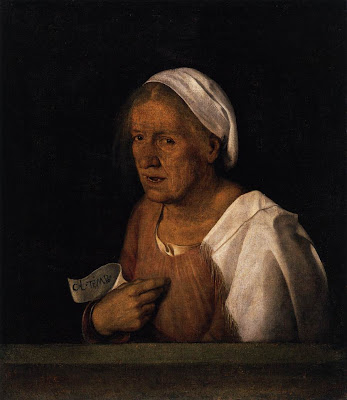Fili hominis, ecce ego tollo a te desiderabile oculorum tuorom in
plaga.--EZECH. xxiv. 16.

How I remember cleaning that strange picture!
I had been deep in duty for my sick neighbour -
His besides my own--over several Sundays,
Often, too, in the week; so with parish pressures,
Baptisms, burials, doctorings, conjugal counsel -
All the whatnots asked of a rural parson -
Faith, I was well-nigh broken, should have been fully
Saving for one small secret relaxation,
One that in mounting manhood had grown my hobby.
This was to delve at whiles for easel-lumber,
Stowed in the backmost slums of a soon-reached city,
Merely on chance to uncloak some worthy canvas,
Panel, or plaque, blacked blind by uncouth adventure,
Yet under all concealing a precious art-feat.
Such I had found not yet. My latest capture
Came from the rooms of a trader in ancient house-gear
Who had no scent of beauty or soul for brushcraft.
Only a tittle cost it--murked with grime-films,
Gatherings of slow years, thick-varnished over,
Never a feature manifest of man's painting.
So, one Saturday, time ticking hard on midnight
Ere an hour subserved, I set me upon it.
Long with coiled-up sleeves I cleaned and yet cleaned,
Till a first fresh spot, a high light, looked forth,
Then another, like fair flesh, and another;
Then a curve, a nostril, and next a finger,
Tapering, shapely, significantly pointing slantwise.
"Flemish?" I said. "Nay, Spanish . . . But, nay, Italian!"
- Then meseemed it the guise of the ranker Venus,
Named of some Astarte, of some Cotytto.
Down I knelt before it and kissed the panel,
Drunk with the lure of love's inhibited dreamings.
Till the dawn I rubbed, when there gazed up at me
A hag, that had slowly emerged from under my hands there,
Pointing the slanted finger towards a bosom
Eaten away of a rot from the lusts of a lifetime . . .
- I could have ended myself in heart-shook horror.
Stunned I sat till roused by a clear-voiced bell-chime,
Fresh and sweet as the dew-fleece under my luthern.
It was the matin service calling to me
From the adjacent steeple.
 I
I

 How I remember cleaning that strange picture!
How I remember cleaning that strange picture!

